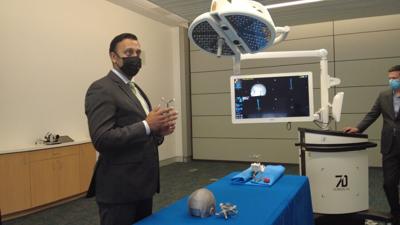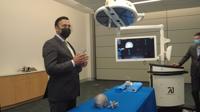DOVER, De. - Before going under the knife, doctors normally order tests and imaging to prepare for surgery. But once you get into the operating room, the surgical team may have to make larger incisions or change course if they cannot pinpoint the exact location they need to see.
The new 7-D technology at Bayhealth Kent Campus changes that.
"It's more streamlined, and it's safer - specifically my first 2 patients with this were both 83 years old. I did a spine case to use this to help direct and keep this entire procedure smaller. And in her age group, by keeping the incision small, the healing time down, she had a much better chance at success," explained Dr. Dawn Tartaglione, Medical Director for Bayhealth Neurosurgery, noting this is the first system of it's kind in the state of Delaware. "Normally, with other systems that do guidance, we have to take films, we have to move the big apparatus for the x-rays around the room. All the doctors and the staff have to wear their full x-ray lead vests that are very heavy under their outer gowns. This system however, let's us take photos as we go. There's no danger, no radiation."
Tartaglione, along with Dr. Amit Goyal, conducted a demonstration Wednesday on the 7-D technology they just began using for patient surgery. The machine allows for doctors to take real time photographs and combine them with the patient's pre-operation MRI to create thousands of data points to map out where they need to make an incision. Goyal says he has used the technology for a handful of tumor removals, all of which has been successful.
"We've seen that the outcomes are dramatically better, the pain is much less, the recovery getting up and moving is much quicker, and patients go home faster. And so we've seen great outcomes from this," Goyal said. "It doesn't replace what the surgeon does, it only helps us achieve what we're trying to do in the safest, most efficient way possible. It allows me to plan and use my tools and my skills the best way that I possibly can, but at the same time it reduces the time the patient is under anesthesia, and for our elderly patients, that can be pretty remarkable the taxing implications that anesthesia has on a patient's heart and lungs, the amount of time it takes to get a tumor out."
The 7-D, because it uses photographs instead of x-ray, is also safer for the surgical staff. Dr. Tartaglione says thyroid cancer among medical professionals can be common if they are exposed to radiation for a long period of time. It also cuts down on patient exposure.
The 7-D technology is only currently offered at Bayhealth Kent Campus, and done on a case by case basis.



